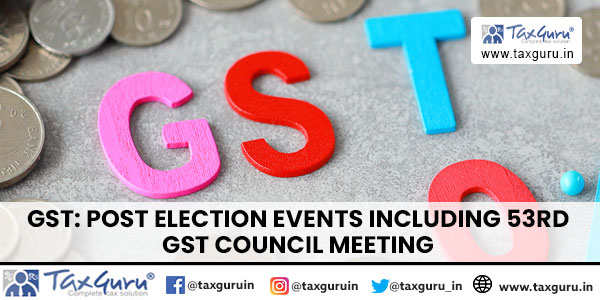Following recent elections, theGST Council convened for its 53rd meeting to address crucial reforms and decisions impacting the Goods and Services Tax (GST) regime in India. This article delves into the outcomes of this pivotal gathering and its implications for taxpayers and stakeholders.
Fetch Ratings has also raised India’s GDP forecast for 2025 to 7.2% (previously 7%). RBI has already indicated an optimistic GDP growth of 7.3% for Q1 of current fiscal, maintaining that growth momentum may be sustained. The apex chamber, CII expects 2024-25 growth to be @ 8%.
The most important event to address these objectives and challenges would be the Union Budget 2024-25 to be presented by the Finance Minister sometime next month. This will also highlight focus areas of new Government in current year and next five years. GST reforms, other tax reforms and GST rate rationalization will also need to be addressed for which GST Council is expected to meet on 22.06.2024.
Now that the new Government at the centre is in place, the first session of Parliament has already commenced from 22 June, 2024 wherein Union Budget 2024-25 shall also be presented in 2nd or 3rd week of July, 2024. It is also expected that the forthcoming budget may announce some amnesty scheme to cut down on litigation and settle legacy disputes.
In the meantime, MoF has sought views of stakeholders on Direct and Indirect Taxes till 17th June, 2024. Views can be given for Central Excise and Custom duty under Indirect Taxes, while in terms of direct taxes, the same can be submitted for personal income tax and Corporate Income Tax (CIT). The Budget does not deal with rates and regulations related to Goods & Services Tax for that one may approach the GST Council. The Finance Bill does propose some changes in GST law, based on recommendations by GST Council.
GST regime shall be completing seven years next week since it came into existence w.e.f. 1st July, 2027. Things that remained under continuous demand include setting-up of Appellate Tribunals and bringing petroleum products / gas under GST net. Further, GST is now all set for rampant litigation and disputes as the gear now shifts from procedures to adjudication and appeals.
The 53rd GST Council meeting, first after election and first in 2024 was held on 22 June, 2024 at New Delhi. Since the meeting was held after a gap of more than eight months, there were a lot of issues deliberated and decided, more so in view of the forthcoming Union Budget in July, 2024 in which legislative changes will be effected.
The 53rd GST Council meeting chaired by Finance Minister aims to ease the compliances for taxpayers by making provisions and procedures simpler and less cumbersome.
GST Council took many decisions / made recommendations, major ones of which are as follows:

- Measures to ease compliance for GST assessees
- No anti-profiteering provisions after 31st March, 2025.
- The time limit to avail input tax credit w.r.t. any invoice or debit note under Section 16(4) of CGST Act, through any GSTR 3B return filed upto 30.11.2021 for FY 2017-18, 2018-19, 2019-20 and 2020-21, shall be deemed to be 30.11.2021
- No levy interest u/s 50 of CGST Act in case of delayed filing of return, on the amount which is available in Electronic Cash Ledger (ECL) on the due date of filing of the said return.
- Provision to recognize general practice of non-levy or short levy of tax by way new power under section 11A to allow regularization of non-levy or short levy of GST where tax was being short paid or not paid due to common trade practice.
- Waiver of interest and penalty for demand notices issued under section 73 (non-fraud cases) for the financial years 2017-18, 2018-19 and 2019-20 subject to the condition that full tax is paid by 31st March, 2025.
- Clarification on valuation of services of corporate guarantee, i.e., higher of 1% of guarantee amount or actual consideration; Rule 28(2) to be amended for related party transactions.
- To reduce litigation, monetary limits for revenue appeals prescribed at Rs. 20 lakh for GSTAT, Rs. one crore for high court and Rs. two crores for Supreme Court. For assesses, no monetary limits exist.
- Maximum amount of pre-deposit in appeals reduced to Rs. 40 crores.
- Cutoff date to be notified for GSTAT appeals.
- Rolling out biometric based Aadhaar authentication on pan-India basis for registration.
- New Form GSTR-1A introduced to facilitate amendment in Form GSTR-1
- Accommodation for students / working in hostels etc to be exempted if amount is Rs. 20,000 p.m. per person and such service is provided for a minimum period of 90 days continuously.
Since there has been change of Governments in few states in last 7-8 months, GST Council will also witness new members. Besides, Group of Ministers (GoMs) will also see change in their constitution.
GST shall be completing seven years in India next week and it is a fact that India has come a long way in GST implementation.
One can look forward to a simplified law and tax structure, liberal input tax credit and quick as & efficient tax dispute resolution mechanism in near future. In fact GST regime needs an 360 degree overhaul to be in its 2.0 mode.





